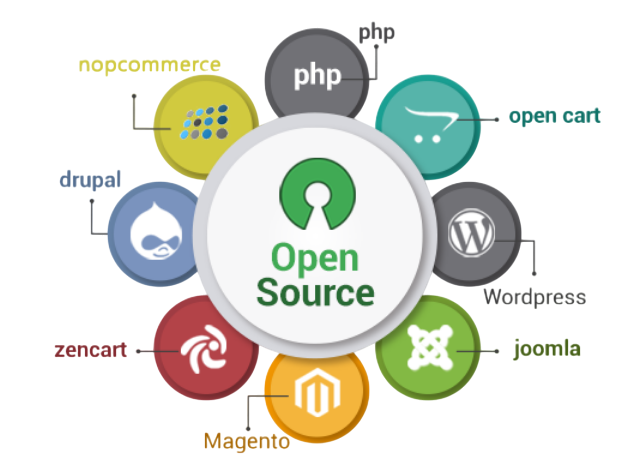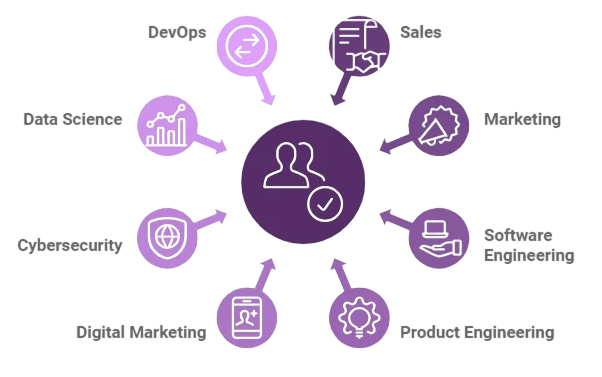
- Introduction to Open Source and Its Ecosystem
- Why Choose a Career in Open Source?
- Key Skills Required for Open Source Jobs
- Popular Open Source Programming Languages and Tools
- Top Job Roles in Open Source (Developer, Maintainer, Evangelist, etc.)
- Open Source Contributions as a Career Launchpad
- Companies Actively Hiring Open Source Contributors
- Platforms to Find Open Source Job Opportunities
- Benefits of Working in Open Source Projects
- Final Thoughts
Introduction to Open Source and Its Ecosystem
Open Source has transformed the software industry by enabling global collaboration and innovation. At its core, open-source software (OSS) is publicly accessible code that anyone can inspect, modify, and enhance. It has birthed some of the most powerful tools and platforms, including Linux, Apache, Kubernetes, Python, and Git. The open-source ecosystem thrives on community participation, transparency, and shared learning. To harness these technologies across the entire development lifecycle, exploring Full Stack Developer Training reveals how mastering both client-side and server-side tools empowers developers to build scalable applications, contribute to open-source projects, and thrive in collaborative tech environments. This decentralized development model fosters rapid innovation and wide adoption, with contributions from both individual volunteers and corporate-sponsored developers. As more companies embrace open-source technologies, the demand for skilled professionals in this space has grown exponentially.
To Earn Your Full Stack Taining Course Certification, Gain Insights From Leading Web Developer Experts And Advance Your Career With ACTE’s Full Stack Developer Training Today!
Why Choose a Career in Open Source?
A career in open source offers flexibility, global recognition, and the opportunity to work on meaningful, high-impact projects. Unlike proprietary software development, open source allows developers to showcase their contributions publicly, making it easier to build a strong portfolio and professional reputation. Open source promotes meritocracy where your code quality and problem-solving abilities speak louder than degrees or formal experience. To choose the right tools for your data-driven projects, exploring SQL and Python Comparison reveals how each language serves distinct roles SQL excels in structured data querying, while Python offers flexibility for scripting, automation, and analytics. Additionally, contributing to open-source projects enhances your skills, exposes you to diverse codebases, and enables collaboration with expert developers worldwide. Many companies now consider open-source contributions as valuable as, or even more than, traditional work experience during recruitment.
Key Skills Required for Open Source Jobs
To succeed in open-source careers, candidates must have a blend of technical and non-technical skills: writing clean code, collaborating across teams, and understanding advanced programming concepts. To sharpen your grasp of functional programming and scope management, exploring JavaScript Closure Example reveals how inner functions retain access to outer variables an essential technique for building modular, secure, and maintainable code in open-source projects.
- Programming Languages: Proficiency in open-source languages such as Python, JavaScript, C++, Go, Java, and Ruby.
- Version Control Systems: Deep understanding of Git and GitHub/GitLab for code collaboration.
- Command Line Usage: Comfort with Unix/Linux command-line operations, as many projects are based on these platforms.
- Documentation: Ability to write clear documentation, read READMEs, and follow contribution guidelines.
- Communication: Strong written communication for reporting issues, submitting pull requests, and discussing solutions in forums or mailing lists.
- Testing and Debugging: Familiarity with unit testing frameworks and debugging open-source codebases.
Being proactive, curious, and community-minded are also vital soft skills in open-source environments.
Would You Like to Know More About Full Stack Developer Training Course? Sign Up For Our Full Stack Developer Training Course Now!
Popular Open Source Programming Languages and Tools
Several programming languages and tools dominate the open-source world:
- Languages: Python, JavaScript (Node.js, React), C/C++, Java, PHP, and Go.
- Tools: Git, Docker, Kubernetes, Ansible, Jenkins, Apache Kafka, and PostgreSQL.
- Frameworks: Django, Flask, Angular, Vue.js, Spring, TensorFlow, and PyTorch.
- Operating Systems: Linux distributions like Ubuntu, Debian, Fedora, and Arch.
- Databases: MySQL, MongoDB, Redis, and MariaDB.

Mastering these tools and technologies can give professionals a solid footing in open-source careers across domains like cloud computing, machine learning, DevOps, and web development.
Top Job Roles in Open Source
Open source offers a wide range of career roles: from backend engineering and DevOps to data science and UI/UX design. To thrive in these roles, developers must understand how data flows through systems and how it’s organized for efficient access and manipulation. Exploring Linear Data Structure reveals how arrays, linked lists, stacks, and queues form the backbone of algorithm design essential for building reliable, scalable open-source solutions.
- Open Source Developer: Contribute to existing open-source software or develop new projects. Responsibilities include writing code, fixing bugs, creating documentation, and mentoring newcomers.
- Maintainer: Maintains and manages open-source repositories. Tasks include reviewing pull requests, setting development roadmaps, and managing community interactions.
- Open Source Evangelist or Advocate: Promotes open-source technologies through blogs, talks, webinars, and events. Helps spread adoption and educates developers about best practices.
- Technical Writer: Prepares documentation, user manuals, and tutorials to help others understand and use the open-source software effectively.
- Community Manager: Builds and nurtures a thriving contributor base, handles communications, organizes meetups, and ensures positive community experiences.
- DevOps Engineer (Open Source Tools): Builds CI/CD pipelines using open-source tools like Jenkins, Ansible, and Kubernetes.
- Security Researcher: Identifies vulnerabilities and submits patches to open-source projects, often working as part of bug bounty or ethical hacking initiatives.
Are You Interested in Learning More About Full Stack Training Course? Sign Up For Our Full Stack Training Course Today!
Open Source Contributions as a Career Launchpad
One of the most powerful aspects of open source is that contributions speak volumes. You don’t need a job title to prove your skills; your pull requests, bug reports, feature additions, and code reviews are visible to the world. Recruiters and hiring managers often explore GitHub profiles to evaluate candidates. Participating in programs like Google Summer of Code (GSoC), Outreachy, or Hacktoberfest can also boost your visibility and credibility in the community. To strengthen your portfolio and showcase end-to-end development skills, exploring Full Stack Developer Training reveals how mastering frontend frameworks, backend logic, and deployment workflows equips you to build production-ready applications and stand out to technical recruiters. These platforms offer stipends, mentorship, and networking opportunities that often lead to full-time open-source careers or research opportunities.
Companies Actively Hiring Open Source Contributors
The open-source ecosystem has become an important source of talent for many tech companies, including both giants and startups. Red Hat stands out as a leader in this area. It builds almost all its products on open-source software and is looking for professionals in engineering, support, and DevOps roles. GitHub employs engineers and community managers who focus on promoting global open-source initiatives. Google connects with the open-source community through programs like Google Summer of Code (GSoC) and actively backs projects such as Kubernetes, TensorFlow, and Angular. Microsoft is another major player. To contribute meaningfully to these ecosystems, exploring Dynamic Programming Explained reveals how breaking problems into overlapping subproblems and storing intermediate results leads to efficient, scalable solutions an essential skill for open-source contributors tackling complex challenges. It contributes to popular projects like Python, Visual Studio Code, and .NET while also hiring open-source maintainers, especially after acquiring GitHub.
Gain Your Master’s Certification in Full Stack Developer Training by Enrolling in Our Full Stack Developer Master Program Training Course Now!
Platforms to Find Open Source Job Opportunities
There are several online platforms where open-source roles are listed:
- GitHub Jobs (archived but still referenced)
- Stack Overflow Careers
- Toptal and Upwork (for freelance OSS projects)
- LinkedIn – Use keywords like “Open Source Developer” or “Remote OSS”
- Remote OK, We Work Remotely, and AngelList
- Open Source Job Board by the Linux Foundation
- Indeed and Glassdoor with filters for open-source and remote roles

Additionally, many companies advertise OSS roles directly on project pages (e.g., Kubernetes, Apache, Mozilla) or through Slack and Discord communities.
Preparing for Full Stack Training Job Interviews? Have a Look at Our Blog on Full Stack Developer Interview Questions and Answers To Ace Your Interview!
Benefits of Working in Open Source Projects
Choosing a career in open source offers numerous benefits: access to global collaboration, faster skill development, and the chance to contribute to impactful projects. To thrive in these environments, developers must write resilient code that gracefully handles unexpected scenarios. Exploring Exception Handling reveals how structured error management ensures stability, improves debugging, and enhances the reliability of open-source contributions across diverse platforms.
- Freedom & Flexibility: Many OSS jobs are remote and asynchronous.
- Skill Growth: Exposure to large codebases and global teams enhances problem-solving and architecture skills.
- Portfolio Building: Your public contributions become your live resume.
- Community Support: Collaborative problem-solving helps you grow faster.
- Networking Opportunities: Connect with global experts, mentors, and hiring managers.
- Job Satisfaction: You contribute to tools that benefit the wider tech ecosystem.
Moreover, many companies allow “20% time” or sponsor employees to contribute to OSS, allowing passion and career to align.
Final Thoughts
Breaking into open source doesn’t require permission, just participation. Start by exploring beginner-friendly projects on GitHub tagged with “good first issue.” Improve documentation, fix small bugs, or help with localization. Join forums, attend open-source meetups, and follow contributors on Twitter or LinkedIn. Build a GitHub profile, document your learning, and stay consistent. To accelerate your journey and gain hands-on experience across the tech stack, exploring Full Stack Developer Training reveals how mastering both frontend and backend technologies empowers you to build complete applications, collaborate effectively, and stand out in today’s competitive developer landscape. Whether you’re a student, a professional developer, or a career switcher, open source offers a dynamic, transparent, and inclusive pathway to impactful and high-paying tech roles. The open-source movement thrives on collaboration. Your skills, curiosity, and dedication can make a real difference.





